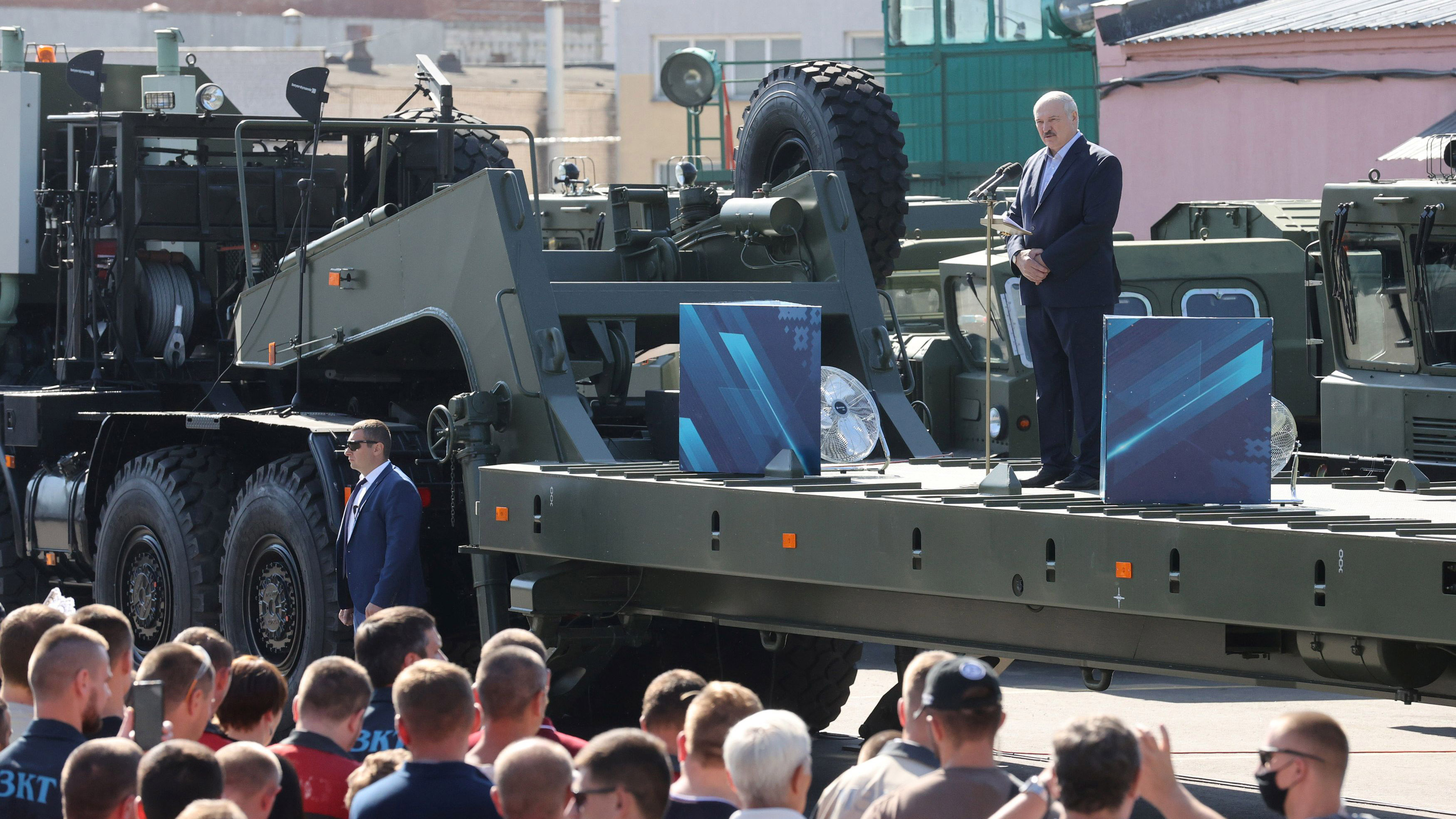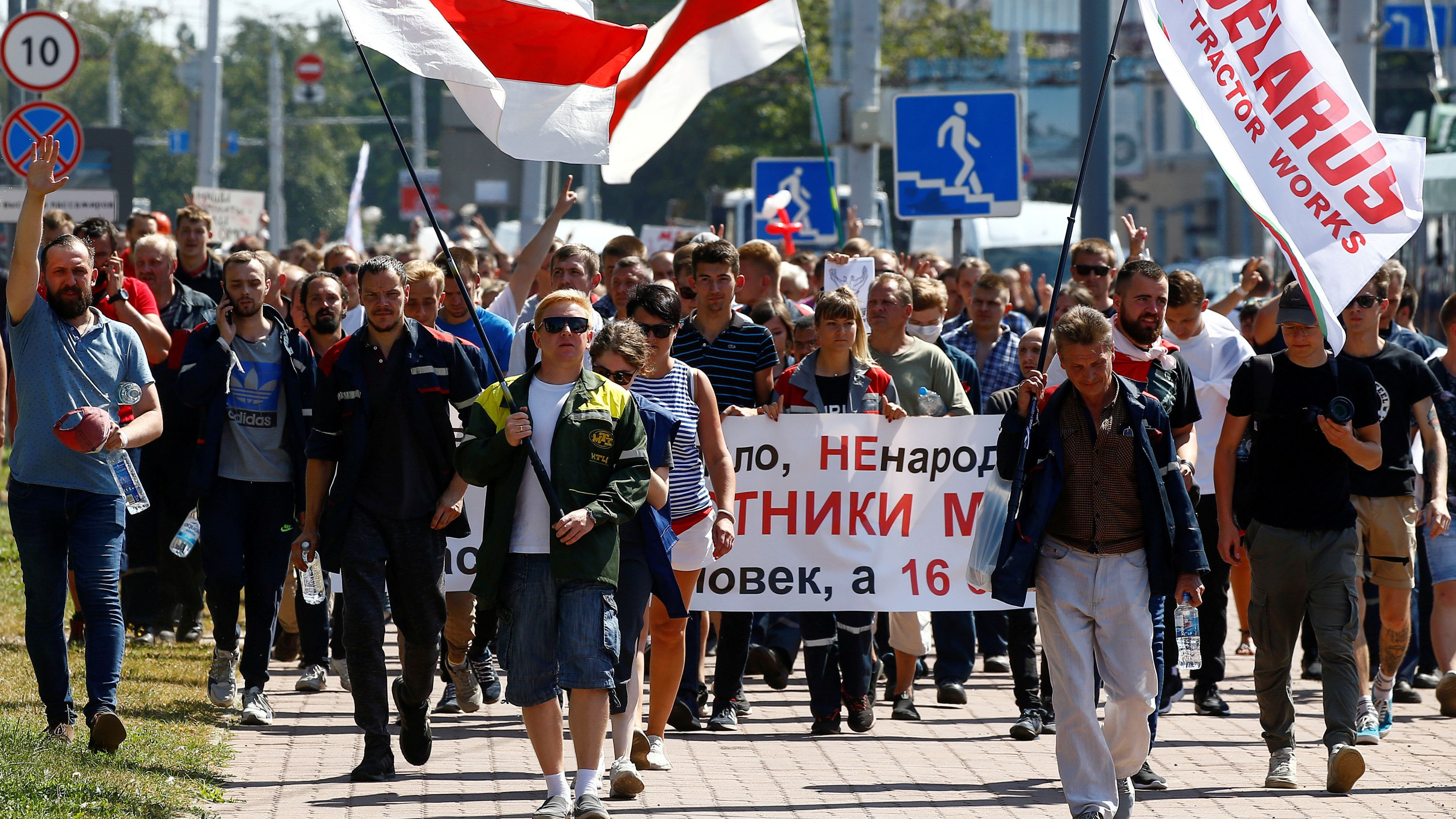Belarusian President Alexander Lukashenko said on Monday he would be ready to hold new elections and hand over power after a constitutional referendum – an attempt to pacify mass protests and strikes that pose the biggest challenge yet to his rule.
He made the offer, which he insisted would not be delivered on while he was under pressure from protesters, after exiled opposition politician Sviatlana Tsikhanouskaya said she was willing to lead the country.
Lukashenko faced heckling and chants of "step down" during a speech to workers at one of the large state-run factories. He also faces the threat of European Union sanctions after a crackdown on protests after the controversial presidential election which resulted in him being re-elected for his sixth consecutive term. Lukashenko cites official results that gave him just over 80 percent of the vote.
00:59

Officials in Washington and the EU want Russia not to meddle in what U.S. President Donald Trump called a "terrible situation," after Moscow told Lukashenko it was ready to provide military help against an external threat.
Russia is watching closely as Belarus hosts pipelines that carry Russian energy exports to the West and is viewed by Moscow as a buffer zone against NATO. Lukashenko and Russian President Vladimir Putin spoke twice this weekend.
Lukashenko used blunt language while speaking to workers on Monday.
"We've held elections," he said. "Until you've killed me there won't be any new elections."
But he offered to change the constitution, an apparent concession that seems unlikely to satisfy protesters who say it's something he has spoken about before.
"We'll put the changes to a referendum, and I'll hand over my constitutional powers. But not under pressure or because of the street," Lukashenko said, in remarks quoted by the official Belta news agency.
"Yes, I'm not a saint. You know my harsh side. I'm not eternal. But if you drag down the first president you'll drag down neighboring countries and all the rest."
He also said people could hold parliamentary and presidential elections after the referendum if that was what they wanted.

People attend an opposition demonstration to protest against presidential election results in Minsk, Belarus, August 17, 2020. /Reuters
People attend an opposition demonstration to protest against presidential election results in Minsk, Belarus, August 17, 2020. /Reuters

Belarusian President Alexander Lukashenko meets with workers as he visits the plant of the heavy off-road vehicles manufacturer MZKT in Minsk, Belarus, August 17, 2020. /Reuters
Belarusian President Alexander Lukashenko meets with workers as he visits the plant of the heavy off-road vehicles manufacturer MZKT in Minsk, Belarus, August 17, 2020. /Reuters
Opposition says ready to lead nation
Speaking in a video address from Lithuania, opposition politician Tsikhanouskaya urged security and law enforcement officers to switch sides.
"I am ready to take responsibility and act as a national leader during this period," Tsikhanouskaya said.
Thousands of protesters had earlier marched to a factory where Lukashenko flew by helicopter to speak to striking workers.
According to RT, several hours prior to the march, a pro-Lukashenko rally was held outside the government's HQ in Minsk, where the incumbent president urged his supporters to "defend your country, independence and families."
According to official figures, this rally gathered about 65,000 people.
Strike action hit Belaruskali, one of the world's largest potash producers, partly shutting production, Russia's TASS news agency cited a local trade union as saying. The state-owned firm, a key source of dollar revenue for Belarus, said its plant was still working.
Lukashenko said he had received a phone call from German Chancellor Angela Merkel: "Yesterday Merkel called, 'I want to talk,'" Interfax news agency quoted him as saying. However, the German government said no conversation had taken place between the two leaders since the August 9 election.
(With input from Reuters, AFP)